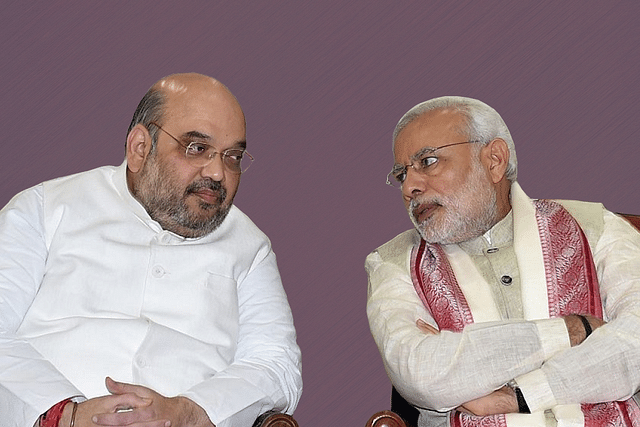
Embarrassing Cancellation Of Modi’s Trip To Assam Should Trigger Rethink On CAA For State
It is imperative for the Union government to calm the anger of the people of Assam by assuring them that the CAA will not affect the state.
Failing to do so would take the state down a dangerous path of unrest and alienation.
The cancellation of Prime Minister Narendra Modi’s scheduled visit to Assam on Friday (10 January) — the second such cancellation of his visit to the state in less than a month — has come as a severe embarrassment for the Bharatiya Janata Party-led state government.
Modi was scheduled to inaugurate the fortnight-long Khelo India Youth Games in Guwahati on Friday.
But the ongoing popular and widespread stir against the Citizenship Amendment Act (CAA) in the state, along with the threat by the powerful All Assam Students' Union (AASU) to “unleash the anger of the people on Modi”, led to cancellation of the visit.
Not only would Modi have faced black flag demonstrations and massive protests, there were also the chances of him being booed at the stadium during the inaugural ceremony.
Assam Chief Minister Sarbananda Sonowal and Finance Minister Himanta Biswa Sarma were booed at the start of the India Vs Sri Lanka T20 match at Barsapara Cricket Stadium in Guwahati last Sunday.
The whole stadium reverberated with ‘Go Back’ and anti-CAA slogans when images of Sonowal and Sarma appeared on the giant screen as they entered the stadium. That left the state BJP leadership and officials red-faced. A probable repeat of this in Prime Minister Modi’s presence would have been ignominious.
The two-day India-Japan summit between Modi and Japanese Premier Shinzo Abe that was scheduled for 15 and 16 December had to be called off amidst violent protests that rocked the state when the Citizenship Amendment Bill was tabled in Parliament.
That Prime Minister Modi had to call off two successive visits to a BJP-ruled state is not only hugely humiliating for the party and the state government, but should also trigger a serious rethink about the Union government persisting with the implementation of CAA in the North-East.
Unlike other parts of the country where anti-CAA protests are largely motivated and engineered mostly by Congress, communists and other opposition parties, the protests in Assam are popular, spontaneous and enjoy the support of a cross-section of the Assamese society.
There is, as such, a fundamental difference between anti-CAA protests in Assam (and the North-East) and other parts of the country (read this).
The indigenous people of Assam and the entire region harbour a genuine fear about the real threat of becoming minorities in their own lands in the face of large scale migration of Bengali Hindus from Bangladesh.
That is because millions of Bengalis — both Hindus and Muslims — have migrated to the region and changed its demographics since the last decades of the nineteenth century. The indigenous population (tribals) of Tripura has already been reduced to a minority in their own state.
In many parts of Assam, too, the percentage of indigenous population has declined alarmingly due to unchecked illegal immigration from East Pakistan and then Bangladesh.
Granting citizenship to another big lot of Bengali Hindus, who have already immigrated to Assam illegally (as the CAA will do), feel the Assamese, will not only further alter the demographics of the state, but will also encourage subsequent waves of immigration of Bengali Hindus from Bangladesh.
Hence, for the indigenous people of Assam, the CAA poses the grave danger of marginalising them in their own lands. And that is why the opposition to CAA is so intense, widespread and also threatens to be long-drawn.
Given this widespread and real fear in the minds of the indigenous people, and the intense and popular anger and opposition to the CAA, it would be prudent for the NDA government in New Delhi to have a rethink on the issue.
Even before the CAB was introduced in Parliament, political parties, civil society groups and many prominent individuals from Assam and the North East made fervent pleas to the Union government to keep the entire region out of the purview of the bill.
The same plea was made by various bodies and persons who Union Home Minister Amit Shah held consultations with before he introduced the CAB in the Lok Sabha.
However, all those pleas went unheeded, resulting in an explosion of popular anger that still continues in the form of sustained protests against the CAA all over Assam.
Since the fears of the indigenous people of Assam (and the North East) are genuine, it is incumbent on the Union government to address them urgently.
New Delhi would be well-advised to bring out an ordinance (which can be ratified later by Parliament) exempting the North East from the purview of the CAA.
If the Union government does not want to take that route, it can frame rules clearly specifying that all those currently residing in any state of the North East who shall be granted Indian citizenship through the CAA will be re-settled in other parts of the country.
Such re-settlements have been tried out earlier (eg, the Dandakaranya Project) and should not be very difficult to work out for the Bengali Hindu immigrants from Bangladesh (now settled in Assam) who will benefit from the CAA.
The Assam government has, over the past few weeks, announced many sops to address the anger of the indigenous people against the CAA. But that has not had any effect.
It is thus imperative for the Union government to calm the anger of the people of Assam by assuring them that the CAA will not affect the state. Failing to do so would take the state down a dangerous path of unrest and alienation.